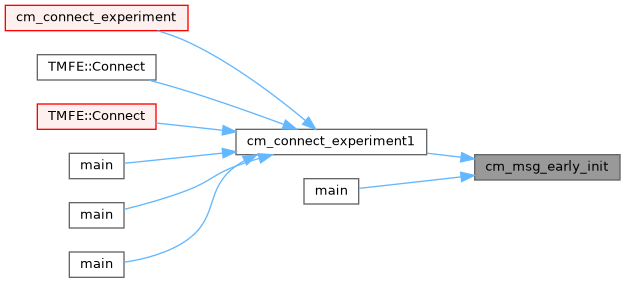Classes | |
| struct | msg_buffer_entry |
Functions | |
| std::string | cm_get_error (INT code) |
| int | cm_msg_early_init (void) |
| int | cm_msg_open_buffer (void) |
| int | cm_msg_close_buffer (void) |
| INT EXPRT | cm_msg_facilities (STRING_LIST *list) |
| void | cm_msg_get_logfile (const char *fac, time_t t, std::string *filename, std::string *linkname, std::string *linktarget) |
| INT | cm_set_msg_print (INT system_mask, INT user_mask, int(*func)(const char *)) |
| INT | cm_msg_log (INT message_type, const char *facility, const char *message) |
| static std::string | cm_msg_format (INT message_type, const char *filename, INT line, const char *routine, const char *format, va_list *argptr) |
| static INT | cm_msg_send_event (DWORD ts, INT message_type, const char *send_message) |
| INT | cm_msg_flush_buffer () |
| INT | cm_msg (INT message_type, const char *filename, INT line, const char *routine, const char *format,...) |
| INT | cm_msg1 (INT message_type, const char *filename, INT line, const char *facility, const char *routine, const char *format,...) |
| INT | cm_msg_register (EVENT_HANDLER *func) |
| static void | add_message (char **messages, int *length, int *allocated, time_t tstamp, const char *new_message) |
| static int | cm_msg_retrieve1 (const char *filename, time_t t, INT n_messages, char **messages, int *length, int *allocated, int *num_messages) |
| INT | cm_msg_retrieve2 (const char *facility, time_t t, INT n_message, char **messages, int *num_messages) |
| INT | cm_msg_retrieve (INT n_message, char *message, INT buf_size) |
Variables | |
| static std::deque< msg_buffer_entry > | gMsgBuf |
| static std::mutex | gMsgBufMutex |
Detailed Description
dox dox
Function Documentation
◆ add_message()
|
static |
Definition at line 1081 of file midas.cxx.

◆ cm_get_error()
| std::string cm_get_error | ( | INT | code | ) |
Convert error code to string. Used after cm_connect_experiment to print error string in command line programs or windows programs.
- Parameters
-
code Error code as defined in midas.h string Error string
- Returns
- CM_SUCCESS
Definition at line 469 of file midas.cxx.

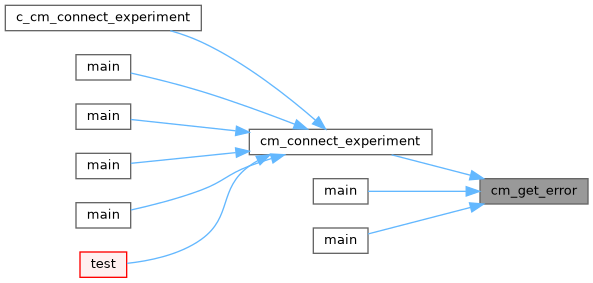
◆ cm_msg()
| INT cm_msg | ( | INT | message_type, |
| const char * | filename, | ||
| INT | line, | ||
| const char * | routine, | ||
| const char * | format, | ||
| ... | |||
| ) |
This routine can be called whenever an internal error occurs or an informative message is produced. Different message types can be enabled or disabled by setting the type bits via cm_set_msg_print().
- Attention
- Do not add the "\n" escape carriage control at the end of the formated line as it is already added by the client on the receiving side. ...cm_msg(MTALK, "my_program", My program is Done!");...
- Parameters
-
message_type (See midas_macro). filename Name of source file where error occured line Line number where error occured routine Routine name. format message to printout, ... Parameters like for printf()
- Returns
- CM_SUCCESS
Definition at line 931 of file midas.cxx.

◆ cm_msg1()
| INT cm_msg1 | ( | INT | message_type, |
| const char * | filename, | ||
| INT | line, | ||
| const char * | facility, | ||
| const char * | routine, | ||
| const char * | format, | ||
| ... | |||
| ) |
This routine is similar to cm_msg(). It differs from cm_msg() only by the logging destination being a file given through the argument list i.e:facility
- Attention
- Do not add the "\n" escape carriage control at the end of the formated line as it is already added by the client on the receiving side. The first arg in the following example uses the predefined macro MINFO which handles automatically the first 3 arguments of the function (see midas_macro). ......//----- File my_log_file.logINT cm_msg1(INT message_type, const char *filename, INT line, const char *facility, const char *routine, const char *format,...)Definition midas.cxx:989
- Parameters
-
message_type See midas_macro. filename Name of source file where error occured line Line number where error occured facility Logging file name routine Routine name format message to printout, ... Parameters like for printf()
- Returns
- CM_SUCCESS
Definition at line 989 of file midas.cxx.
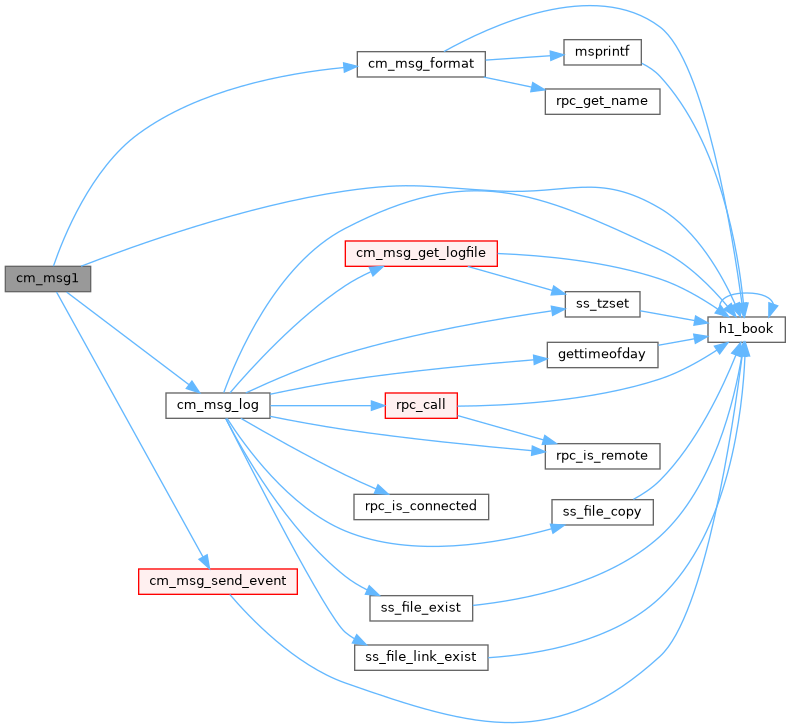
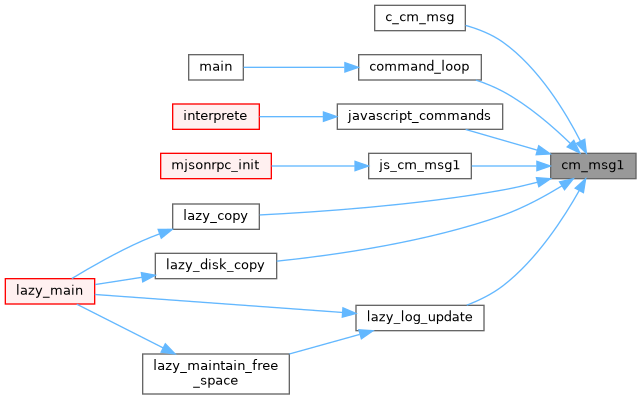
◆ cm_msg_close_buffer()
| int cm_msg_close_buffer | ( | void | ) |
Definition at line 501 of file midas.cxx.
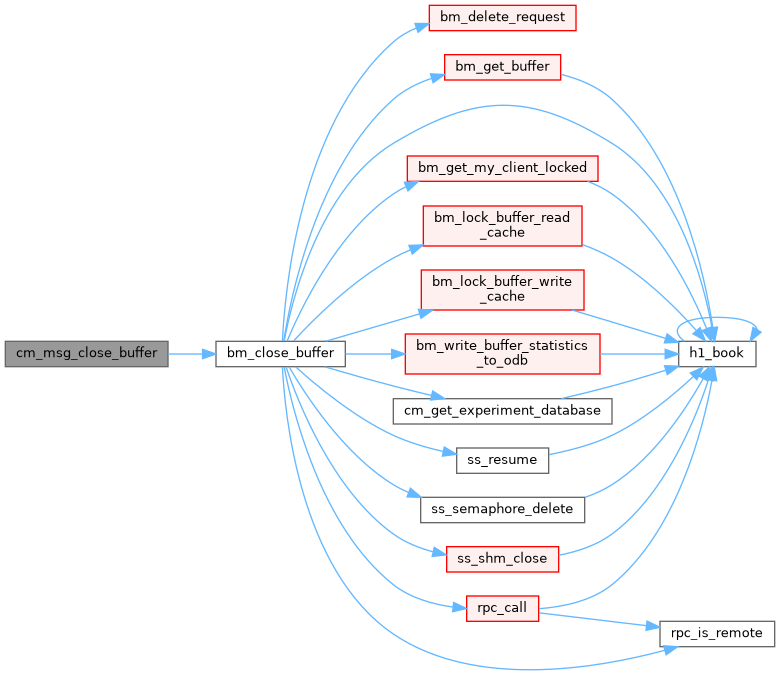

◆ cm_msg_early_init()
| int cm_msg_early_init | ( | void | ) |
◆ cm_msg_facilities()
| INT EXPRT cm_msg_facilities | ( | STRING_LIST * | list | ) |
Retrieve list of message facilities by searching logfiles on disk
- Parameters
-
list List of facilities
- Returns
- status SUCCESS
Definition at line 518 of file midas.cxx.
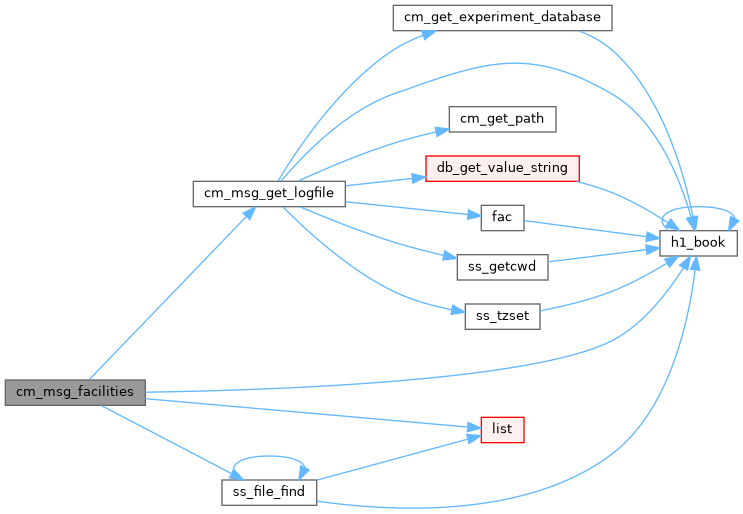

◆ cm_msg_flush_buffer()
| INT cm_msg_flush_buffer | ( | void | ) |
This routine can be called to process messages buffered by cm_msg(). Normally it is called from cm_yield() and cm_disconnect_experiment() to make sure all accumulated messages are processed.
Definition at line 881 of file midas.cxx.
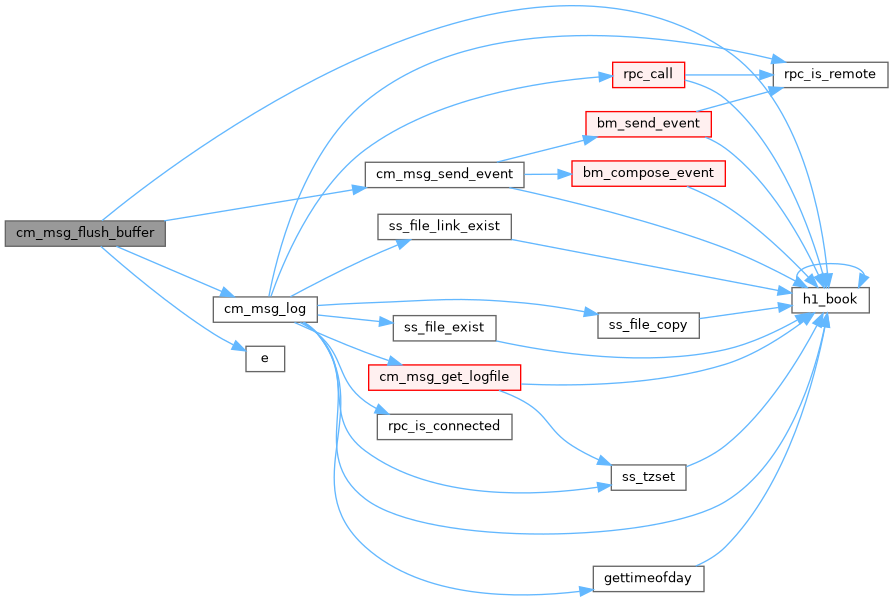
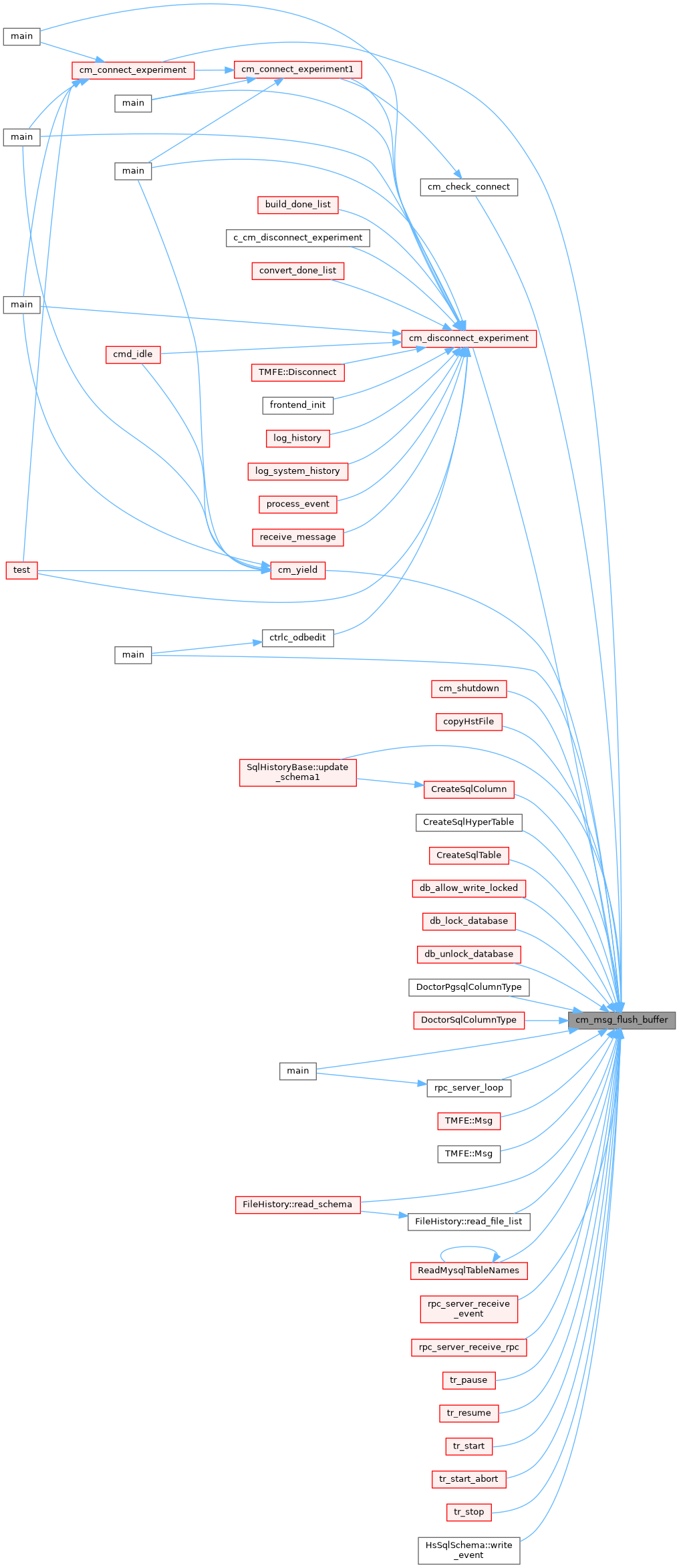
◆ cm_msg_format()
|
static |
Definition at line 765 of file midas.cxx.

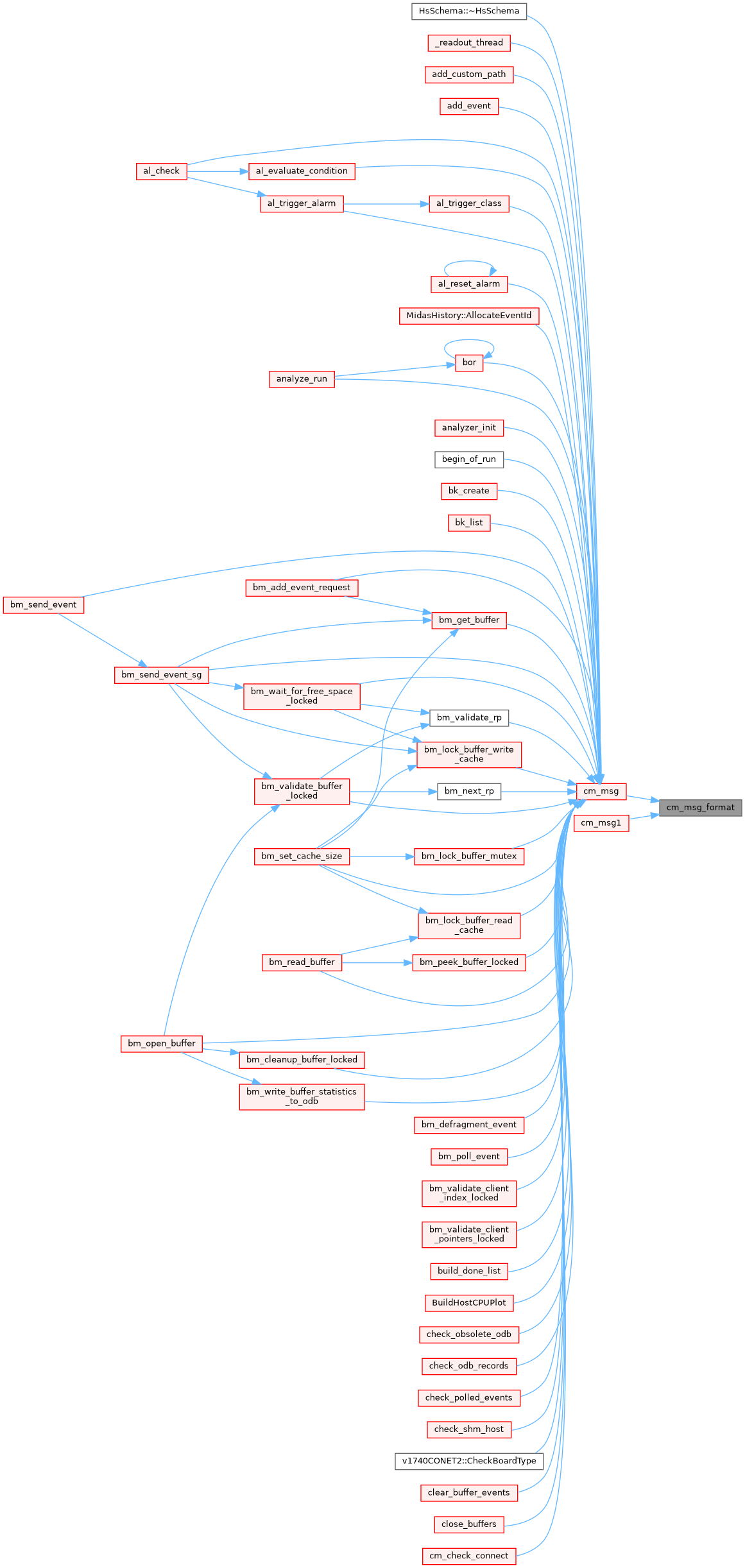
◆ cm_msg_get_logfile()
| void cm_msg_get_logfile | ( | const char * | fac, |
| time_t | t, | ||
| std::string * | filename, | ||
| std::string * | linkname, | ||
| std::string * | linktarget | ||
| ) |
Definition at line 553 of file midas.cxx.
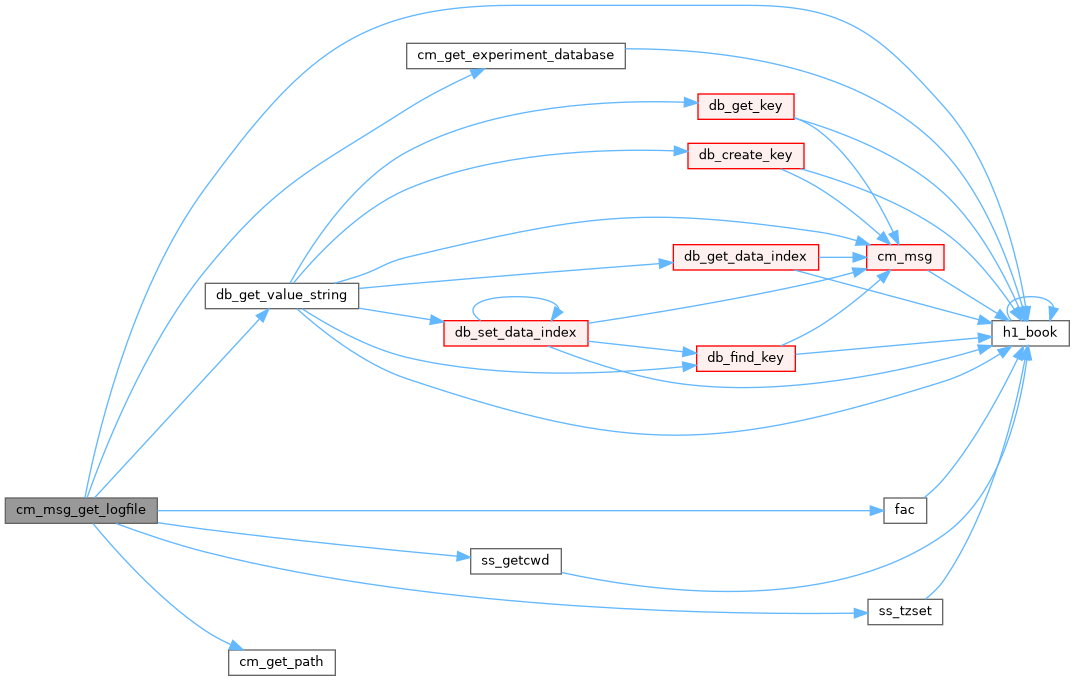
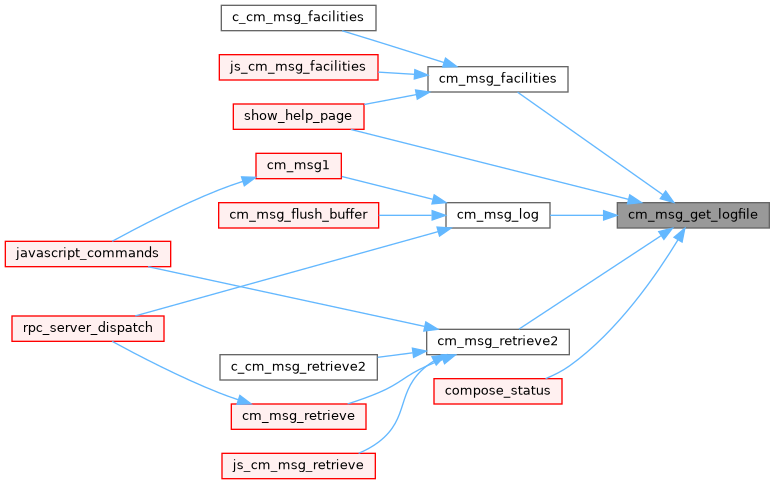
◆ cm_msg_log()
Write message to logging file. Called by cm_msg.
- Attention
- May burn your fingers
- Parameters
-
message_type Message type message Message string facility Message facility, filename in which messages will be written
- Returns
- CM_SUCCESS
Definition at line 678 of file midas.cxx.
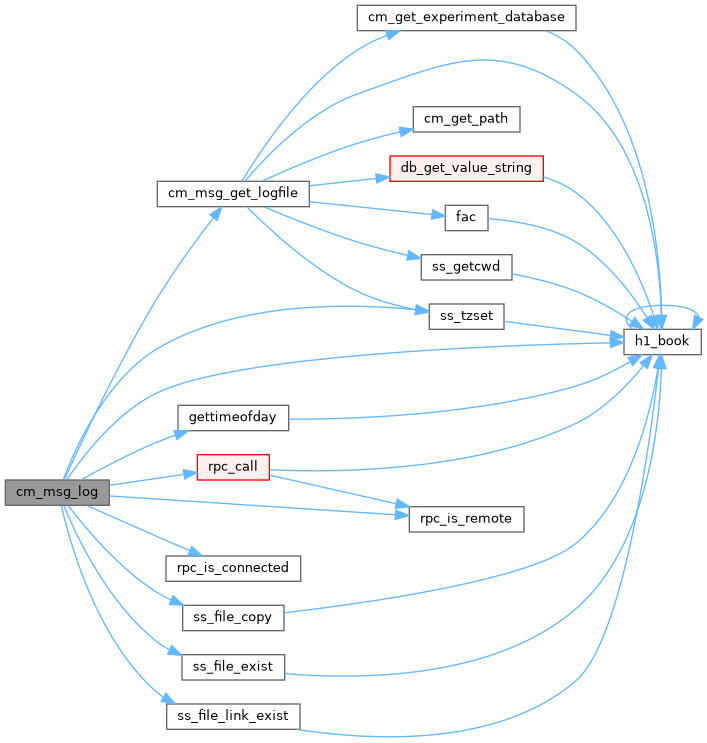
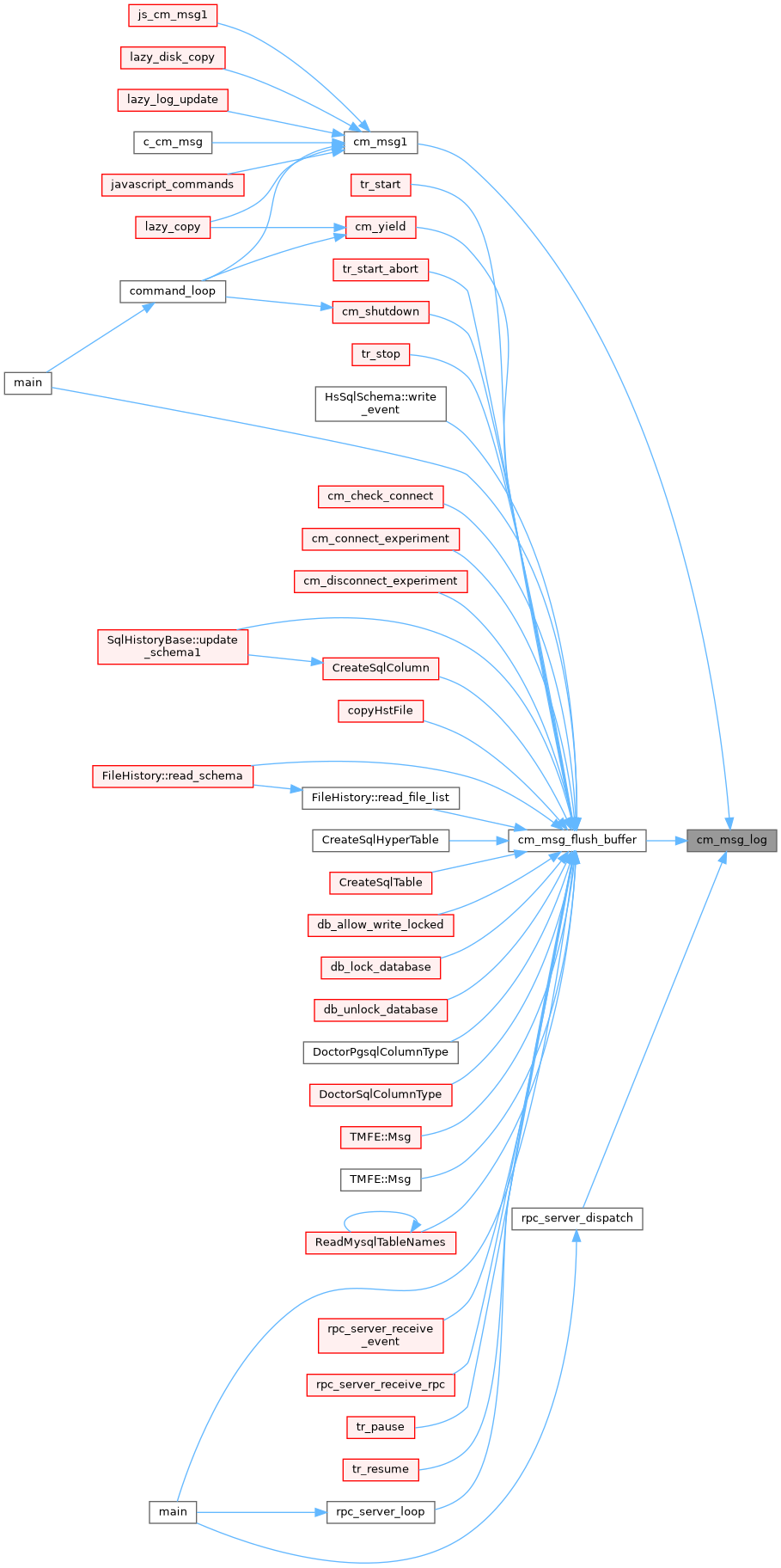
◆ cm_msg_open_buffer()
| int cm_msg_open_buffer | ( | void | ) |
Definition at line 488 of file midas.cxx.
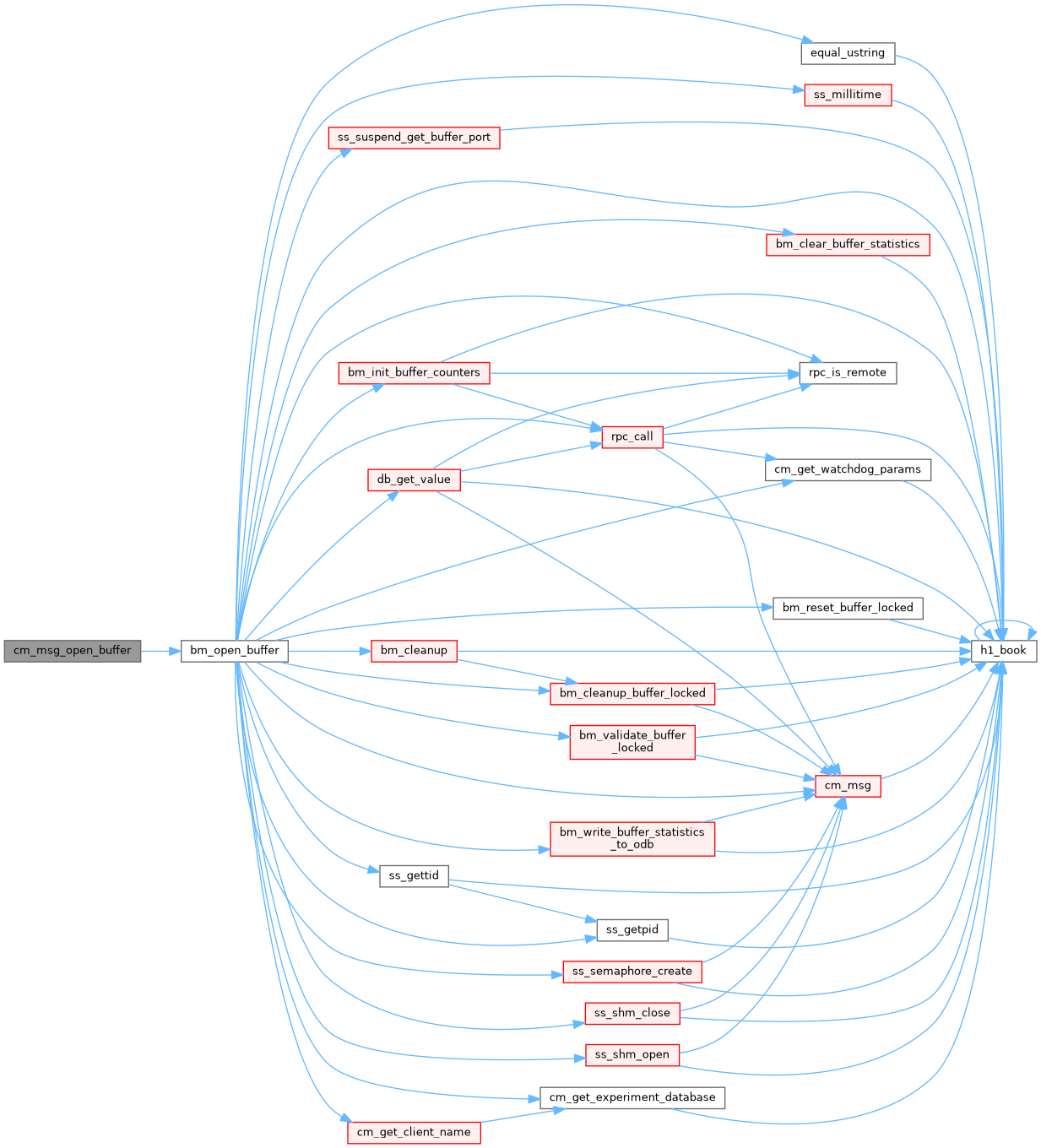
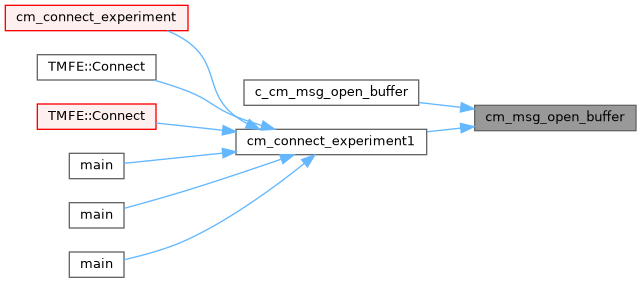
◆ cm_msg_register()
| INT cm_msg_register | ( | EVENT_HANDLER * | func | ) |
Register a dispatch function for receiving system messages.
- example code from mlxspeaker.c {char str[256], *pc, *sp;// print messageprintf("evID:%x Mask:%x Serial:%i Size:%d\n",header->event_id,header->trigger_mask,header->serial_number,header->data_size);...// skip none talking messageheader->trigger_mask == MT_USER)...}{...// now connect to serverreturn 1;// Register callback for messages...}INT cm_connect_experiment(const char *host_name, const char *exp_name, const char *client_name, void(*func)(char *))Definition midas.cxx:2294void receive_message(HNDLE hBuf, HNDLE id, EVENT_HEADER *header, void *message)Definition mlxspeaker.cxx:49Definition midas.h:852
- Parameters
-
func Dispatch function.
- Returns
- CM_SUCCESS or bm_open_buffer and bm_request_event return status
Definition at line 1067 of file midas.cxx.

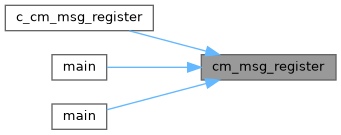
◆ cm_msg_retrieve()
Retrieve newest messages from "midas" facility log file
- Parameters
-
n_message Number of messages to retrieve message buf_size bytes of messages, separated by
characters. The returned number of bytes is normally smaller than the initial buf_size, since only full lines are returned.*buf_size Size of message buffer to fill
- Returns
- CM_SUCCESS, CM_TRUNCATED
Definition at line 1350 of file midas.cxx.
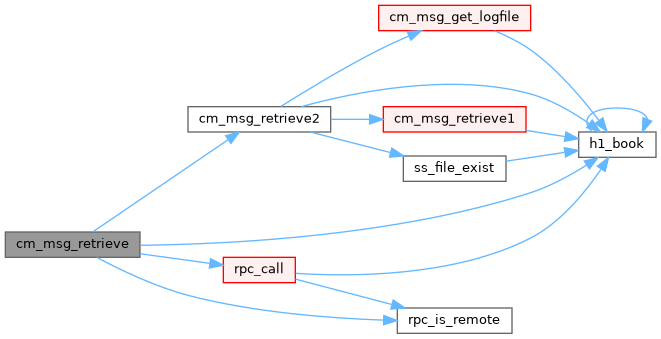

◆ cm_msg_retrieve1()
|
static |
Definition at line 1112 of file midas.cxx.
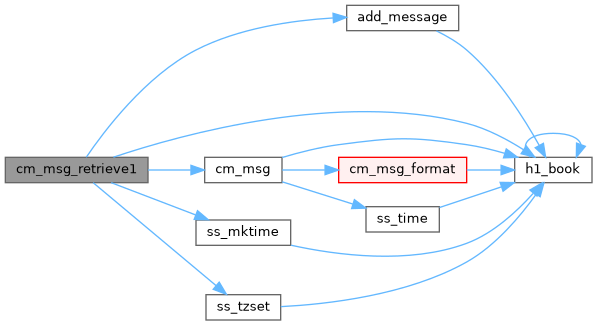

◆ cm_msg_retrieve2()
| INT cm_msg_retrieve2 | ( | const char * | facility, |
| time_t | t, | ||
| INT | n_message, | ||
| char ** | messages, | ||
| int * | num_messages | ||
| ) |
Retrieve old messages from log file
- Parameters
-
facility Logging facility ("midas", "chat", "lazy", ...) t Return messages logged before and including time t, value 0 means start with newest messages min_messages Minimum number of messages to return messages messages, newest first, separated by
characters. caller should free() this buffer at the end.num_messages Number of messages returned
- Returns
- CM_SUCCESS
Definition at line 1280 of file midas.cxx.
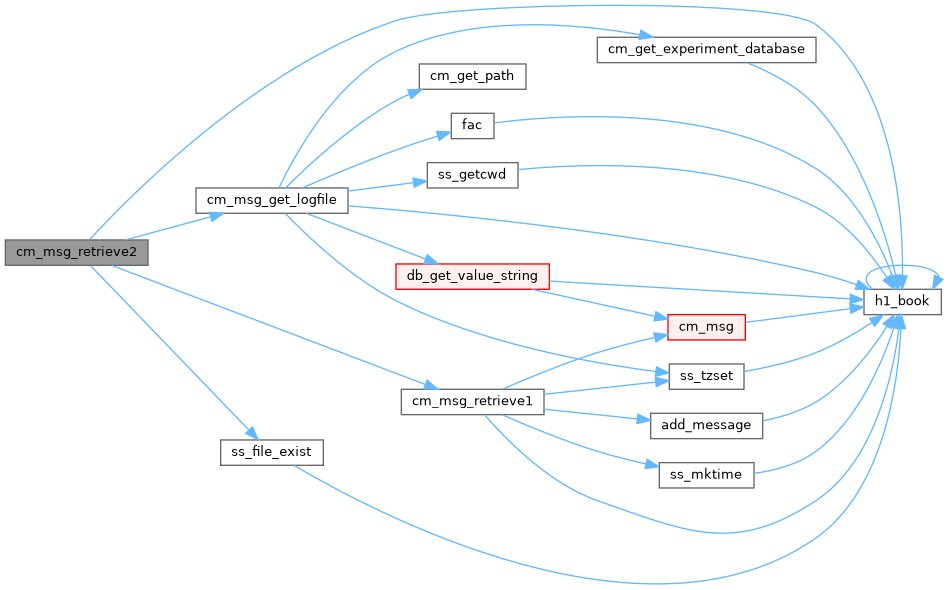
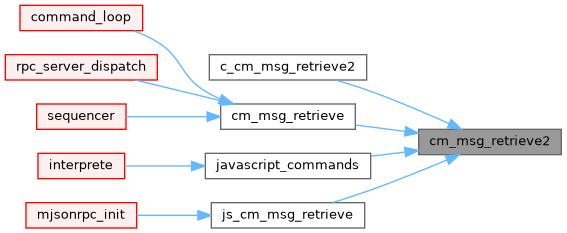
◆ cm_msg_send_event()
Definition at line 840 of file midas.cxx.

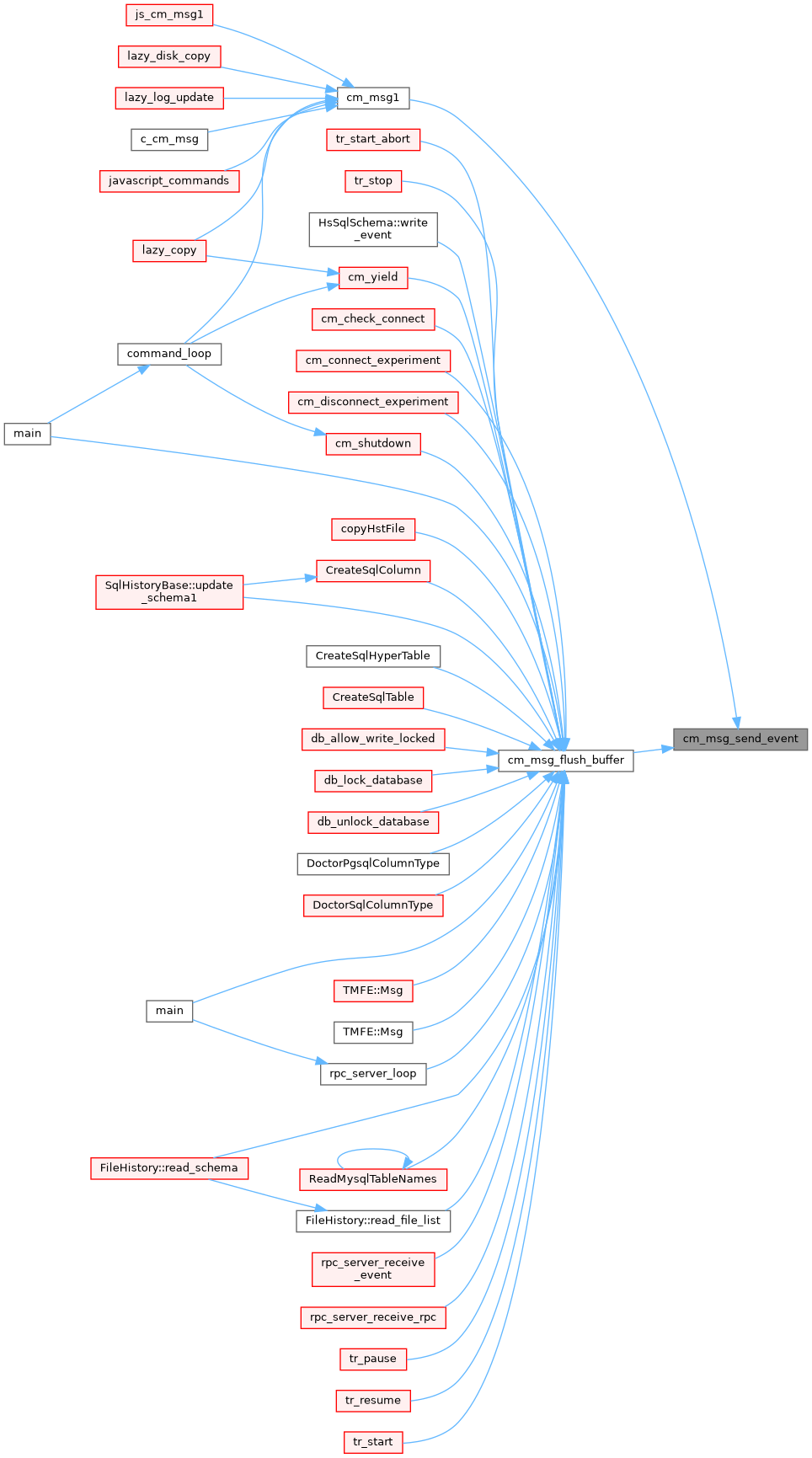
◆ cm_set_msg_print()
Set message masks. When a message is generated by calling cm_msg(), it can got to two destinatinons. First a user defined callback routine and second to the "SYSMSG" buffer.
A user defined callback receives all messages which satisfy the user_mask.
- Parameters
-
system_mask Bit masks for MERROR, MINFO etc. to send system messages. user_mask Bit masks for MERROR, MINFO etc. to send messages to the user callback. func Function which receives all printout. By setting "puts", messages are just printed to the screen.
- Returns
- CM_SUCCESS
Definition at line 661 of file midas.cxx.
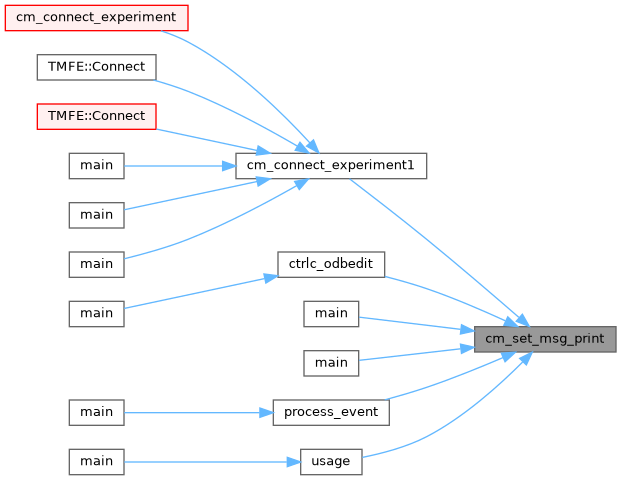
Variable Documentation
◆ gMsgBuf
|
static |
